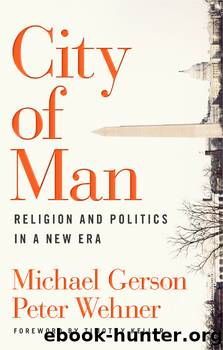City of Man by Michael Gerson

Author:Michael Gerson [Gerson, Michael]
Language: eng
Format: epub
ISBN: 978-1-57567-928-0
Publisher: Moody Publishers
Published: 2010-01-15T00:00:00+00:00
CHAPTER FOUR
The Morality of Human Rights
In thinking about the future shape of social and political engagement by Christian conservatives, it is helpful to differentiate between âdomesticâ and âforeignâ concerns. If we begin in this chapter with the realm of the international, it is because the stakes there often seem highest.
For good reason: issues of war and peace, human rights and genocide, extreme poverty and pandemics have massive human consequences and, therefore, unavoidably moral dimensions. A political theology that fails to reach beyond national borders would be narrow indeed. And yet, nowhere do the views of Christians appear more diverse, even disjointed, than when it comes to foreign affairsâand to the formulation of the nationâs foreign policy by American presidents impelled by explicitly Christian beliefs.
In the World War I era, Woodrow Wilson brought explicitly Christian assumptions to his brand of foreign-policy liberalism. He was an idealist about Americaâs global roleâmaking the world safe for democracy, was the way he put itâand a moralist about Europeâs failures in this regard. No wonder British Prime Minister David Lloyd George observed of him: âI really think that at first the idealistic President regarded himself as a missionary whose function was to rescue the poor European heathen from their agelong worship of false and fiery gods.â1
Was Wilson successful? His first secretary of state was the prominent evangelical William Jennings Bryan, whom we have already met. In 1913 and 1914, Bryan negotiated thirty âcooling-off treatiesâ in which disputing nations agreed to submit their disagreements to binding international arbitration and wait a year before taking any unilateral action. Almost immediately, the agreements proved to be useless scraps of paper. As Wilson moved America toward war in Europe, Bryan resigned in protest.
Skip forward many decades to President Jimmy Carter, himself an evangelical and one who brought a similar religious framework to foreign affairs. Carter placed conspicuous rhetorical emphasis on human rights and the resolution of conflict. âThere is no nobler calling on this earth than the seeking for peace,â he said. âFor it is the reason which caused the Bible to say that peacemakers shall be called sons of God.â2 America, Carter proclaimed, would be âthe champion of peace, freedom, and democracy, of human rights, environmental quality, and the alleviation of suffering.â3 His record too was mixed, as rhetoric and action often failed to achieve a meaningful match.
Indeed, this may be why the main influence of evangelical Christians on more recent foreign policy has been to support conservative presidents with notably more muscular approaches to the international scene. In the final decade of the Cold War, evangelicals were strong supporters of President Ronald Reaganâs military buildup and rollback strategy against the Soviet Union. During George W. Bushâs presidency, they remained some of the most reliable supporters of the Iraq war even after other groups had lost faith in the enterprise.
And yet, despite the very serious foreign-policy disagreements between a Jimmy Carter and a George W. Bush, both were informed by Christian convictions. Is it then possible to discern
Download
This site does not store any files on its server. We only index and link to content provided by other sites. Please contact the content providers to delete copyright contents if any and email us, we'll remove relevant links or contents immediately.
| Africa | Americas |
| Arctic & Antarctica | Asia |
| Australia & Oceania | Europe |
| Middle East | Russia |
| United States | World |
| Ancient Civilizations | Military |
| Historical Study & Educational Resources |
Cecilia; Or, Memoirs of an Heiress — Volume 1 by Fanny Burney(32538)
Cecilia; Or, Memoirs of an Heiress — Volume 2 by Fanny Burney(31934)
Cecilia; Or, Memoirs of an Heiress — Volume 3 by Fanny Burney(31925)
The Secret History by Donna Tartt(19025)
Sapiens: A Brief History of Humankind by Yuval Noah Harari(14358)
Leonardo da Vinci by Walter Isaacson(13305)
The Radium Girls by Kate Moore(12012)
Sapiens by Yuval Noah Harari(5363)
How Democracies Die by Steven Levitsky & Daniel Ziblatt(5210)
The Wind in My Hair by Masih Alinejad(5085)
Homo Deus: A Brief History of Tomorrow by Yuval Noah Harari(4897)
Endurance: Shackleton's Incredible Voyage by Alfred Lansing(4750)
Man's Search for Meaning by Viktor Frankl(4569)
The Silk Roads by Peter Frankopan(4522)
Millionaire: The Philanderer, Gambler, and Duelist Who Invented Modern Finance by Janet Gleeson(4457)
The Rape of Nanking by Iris Chang(4197)
Joan of Arc by Mary Gordon(4092)
The Motorcycle Diaries by Ernesto Che Guevara(4082)
Stalin by Stephen Kotkin(3955)
